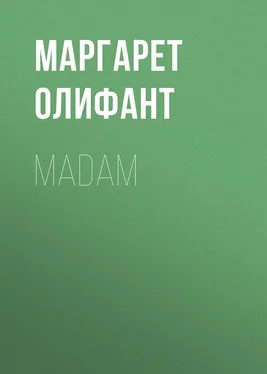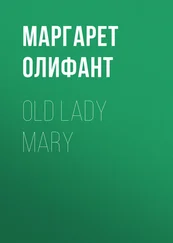Маргарет Олифант - Madam
Здесь есть возможность читать онлайн «Маргарет Олифант - Madam» — ознакомительный отрывок электронной книги совершенно бесплатно, а после прочтения отрывка купить полную версию. В некоторых случаях можно слушать аудио, скачать через торрент в формате fb2 и присутствует краткое содержание. Жанр: foreign_prose, literature_19, foreign_antique, на английском языке. Описание произведения, (предисловие) а так же отзывы посетителей доступны на портале библиотеки ЛибКат.
- Название:Madam
- Автор:
- Жанр:
- Год:неизвестен
- ISBN:нет данных
- Рейтинг книги:5 / 5. Голосов: 1
-
Избранное:Добавить в избранное
- Отзывы:
-
Ваша оценка:
- 100
- 1
- 2
- 3
- 4
- 5
Madam: краткое содержание, описание и аннотация
Предлагаем к чтению аннотацию, описание, краткое содержание или предисловие (зависит от того, что написал сам автор книги «Madam»). Если вы не нашли необходимую информацию о книге — напишите в комментариях, мы постараемся отыскать её.
Madam — читать онлайн ознакомительный отрывок
Ниже представлен текст книги, разбитый по страницам. Система сохранения места последней прочитанной страницы, позволяет с удобством читать онлайн бесплатно книгу «Madam», без необходимости каждый раз заново искать на чём Вы остановились. Поставьте закладку, и сможете в любой момент перейти на страницу, на которой закончили чтение.
Интервал:
Закладка:
The conversation was interrupted by the servants who came to close doors and windows, and perform the general shutting-up for the night. Neither of the gentlemen was sorry for this interruption. They separated to make that inevitable change in their dress which the smoking-room demands, with a certain satisfaction in getting rid of the subject, if even for a moment. But when Dr. Beaton reached, through the dim passages from which all life had retired, that one centre of light and fellowship, the sight of young Hamerton in his evening coat, with a pale and disturbed countenance, brought back to him the subject he had been so glad to drop. Hamerton had forgotten his dress-coat, and even that smoking-suit which was the joy of his heart. He had been a prisoner in the drawing-room, or rather in the conservatory, while that terrible scene went on. Never in his harmless life had he touched the borders of tragedy before, and he was entirely unmanned. The doctor found him sitting nervously on the edge of a chair, peering into the fire, his face haggard, his eyes vacant and bloodshot. “I say, doctor,” he said, making a grasp at his arm, “I want to tell you; I was in there all the time. What could I do? I couldn’t get out with the others. I had been in the conservatory before—and I saw— Good gracious, you don’t think I wanted to see! I thought it was better to keep quiet than to show that I had been there all the time.”
“You ought to have gone away with the others,” said the doctor, “but there is no great harm done; except to your nerves; you look quite shaken. He was very bad. When a man lets himself go on every occasion, and does and says exactly what he has a mind to, that’s what it ends in at the last. It is, perhaps, as well that a young fellow like you should know.”
“Oh, hang it,” said young Hamerton, “that is not the worst. I never was fond of old Trevanion. It don’t matter so much about him.”
“You mean that to hear a man bullying his wife like that makes you wish to kill him, eh? Well, that’s a virtuous sentiment; but she’s been long used to it. Let us hope she is like the eels and doesn’t mind—”
“It’s not that,” said the youth again. John Trevanion was in no hurry to appear, and the young man’s secret scorched him. He looked round suspiciously to make sure there was no one within sight or hearing. “Doctor,” he said, “you are Madam’s friend. You take her side?”
Dr. Beaton, who was a man of experience, looked at the agitation of his companion with a good deal of curiosity and some alarm. “If she had a side, yes, to the last of my strength.”
“Then I don’t mind telling you. When he began to swear— What an old brute he is!”
“Yes? when he began to swear—”
“I thought they mightn’t like it, don’t you know? We’re old friends at home, but still I have never been very much at Highcourt; so I thought they mightn’t like to have me there. And I thought I’d just slip out of the way into the conservatory, never thinking how I was to get back. I went right in to the end part where there was no light. You can see out into the park. I never thought of that. I was not thinking anything: when I saw—”
“Get it out, for Heaven’s sake! You had no right to be there. What did you see? Some of the maids about—”
“Doctor, I must get it off my mind. I saw Madam Trevanion parting with—a man. I can’t help it, I must get it out. I saw her as plainly as I see you.”
The doctor was very much disturbed and pale, but he burst into a laugh. “In a dark night like this! You saw her maid I don’t doubt, or a kitchen girl with her sweetheart. At night all the cats are gray. And you think it is a fine thing to tell a cock-and-bull story like this—you, a visitor in the house?”
“Doctor, you do me a great deal of injustice.” The young man’s heart heaved with agitation and pain. “Don’t you see it is because I feel I was a sort of eavesdropper against my will, that I must tell you? Do you think Madam Trevanion could be mistaken for a maid? I saw her—part from him and come straight up to the house—and then, in another moment, she came into the room, and I—I saw all that happened there.”
“For an unwilling witness, Mr. Hamerton, you seem to have seen a great deal,” said the doctor, with a gleam of fury in his eyes.
“So I was—unwilling, most unwilling: you said yourself my nerves were shaken. I’d rather than a thousand pounds I hadn’t seen her. But what am I to do? If there was any trial or anything, would they call me as a witness? That’s what I want to ask. In that case I’ll go off to America or Japan or somewhere. They sha’n’t get a word against her out of me.”
The moral shock which Dr. Beaton had received was great, and yet he scarcely felt it to be a surprise. He sat for some moments in silence, pondering how to reply. The end of his consideration was that he turned round upon the inquirer with a laugh. “A trial,” he said, “about what? Because Mr. Trevanion is nasty to his wife, and says things to her a man should be ashamed to say? Women can’t try their husbands for being brutes, more’s the pity! and she is used to it; or because (if it was her at all) she spoke to somebody she met—a groom most likely—and gave him his orders! No, no, my young friend, there will be no trial. But for all that,” he added, somewhat fiercely, “I would advise you to hold your tongue on the subject now that you have relieved your mind. The Trevanions are kittle customers when their blood’s up. I would hold my tongue for the future if I were you.”
And then John Trevanion came in, cloudy and thoughtful, in his smoking-coat, with a candle in his hand.
CHAPTER VI
Reginald Trevanion of Highcourt had made at thirty a marriage which was altogether suitable, and everything that the marriage of a young squire of good family and considerable wealth ought to be, with a young lady from a neighboring county with a pretty face and a pretty fortune, and connections of the most unexceptionable kind. He was not himself an amiable person even as a young man, but no one had ever asserted that his temper or his selfishness or his uneasy ways had contributed to bring about the catastrophe which soon overwhelmed the young household. A few years passed with certain futile attempts at an heir which came to nothing; and it was thought that the disappointment in respect to Rosalind, who obstinately insisted upon turning out a girl, notwithstanding her poor young mother’s remorseful distress and her father’s refusal to believe that Providence could have played him so cruel a trick, had something to do with the gradual fading away of young Madam Trevanion. She died when Rosalind was but a few weeks old, and her husband, whom all the neighborhood credited with a broken heart, disappeared shortly after into that vague world known in a country district as “Abroad;” where healing, it is to be supposed, or at least forgetfulness, is to be found for every sorrow. Nothing was known of him for a year or two. His brother, John Trevanion, was then a youth at college, and, as Highcourt was shut up during its master’s absence, disposed of his vacation among other branches of the family, and never appeared; while Sophy, the only sister, who had married long before, was also lost to the district. And thus all means of following the widower in his wanderings were lost to his neighbors. When Mr. Trevanion returned, three years after his first wife’s death, the first intimation that he had married again was the appearance of the second Madam Trevanion by his side in the carriage. The servants, indeed, had been prepared by a letter, received just in time to enable them to open hurriedly the shut-up rooms, and make ready for a lady; but that was all. Of course, as everybody allowed, there was nothing surprising in the fact. It is to be expected that a young widower, especially if heartbroken, will marry again; the only curious thing was that no public intimation of the event should have preceded the arrival of the pair. There had been nothing in the papers, no intimation “At the British Embassy—,” no hint that an English gentleman from one of the Midland counties was about to bring home a charming wife. And, as a matter of fact, nobody had been able to make out who Mrs. Trevanion was. Her husband and she had met abroad. That was all that was ever known. For a time the researches of the parties interested were very active, and all sorts of leading questions were put to the new wife. But she was of force superior to the country ladies, and baffled them all. And the calm of ordinary existence closed over Highcourt, and the questions in course of time were forgot. Madam Trevanion was not at all of the class of her predecessor. She was not pretty like that gentle creature. Even those who admired her least owned that she was striking, and many thought her handsome, and some beautiful. She was tall; her hair and her eyes were dark; she had the wonderful grace of bearing and movement which is associated with the highest class, but no more belongs to it exclusively than any other grace or gift. Between Madam Trevanion and the Duchess of Newbury, who was herself a duke’s daughter, and one of the greatest ladies in England, no chance spectator would have hesitated for a moment as to which was the highest; and yet nobody knew who she was. It was thought by some persons that she showed at first a certain hesitation about common details of life which proved that she had not been born in the purple. But, if so, all that was over before she had been a year at Highcourt, and her manners were pronounced by the best judges to be perfect. She was not shy of society as a novice would have been, nor was her husband diffident in taking her about, as a proud man who has married beneath him so generally is. They accepted all their invitations like people who were perfectly assured of their own standing, and they saw more company at Highcourt than that venerable mansion had seen before for generations. And there was nothing to which society could take exception in the new wife. She had little Rosalind brought home at once, and was henceforth as devoted as any young mother could be to the lovely little plaything of a three-years-old child. Then she did her duty by the family as it becomes a wife to do. The first was a son, as fine a boy as was ever born to a good estate, a Trevanion all over, though he had his mother’s eyes—a boy that never ailed anything, as robust as a young lion. Five or six others followed, of whom two died; but these were ordinary incidents of life which establish a family in the esteem and sympathy of its neighbors. The Trevanions had fulfilled all that was needed to be entirely and fully received into the regard of the county when they “buried,” as people say, their two children. Four remained, the first-born, young Reginald, and his next sister, who were at the beginning of this history fourteen and nine respectively, and the two little ones of five and seven, who were also, to fulfil all requirements, girl and boy.
Читать дальшеИнтервал:
Закладка:
Похожие книги на «Madam»
Представляем Вашему вниманию похожие книги на «Madam» списком для выбора. Мы отобрали схожую по названию и смыслу литературу в надежде предоставить читателям больше вариантов отыскать новые, интересные, ещё непрочитанные произведения.
Обсуждение, отзывы о книге «Madam» и просто собственные мнения читателей. Оставьте ваши комментарии, напишите, что Вы думаете о произведении, его смысле или главных героях. Укажите что конкретно понравилось, а что нет, и почему Вы так считаете.












